Jeep Avenger vs VW Caddy – Differences & prices compared
Compare performance, boot space, consumption and price in one view.
Find out now: which car is the better choice for you – Jeep Avenger or VW Caddy?
The Jeep Avenger (SUV) comes with a Electric, Petrol or Petrol MHEV engine and Automatic or Manuel transmission. In comparison, the VW Caddy (High Roof Estate) features a Petrol, Diesel or Plugin Hybrid engine with Manuel or Automatic transmission.
When it comes to boot capacity, the Jeep Avenger offers 380 L, while the VW Caddy provides – depending on how much space you need. If you’re looking for more power, decide whether the 156 HP of the Jeep Avenger or the 150 HP of the VW Caddy suits your needs better.
In terms of consumption, the values are 15.50 kWh4.90 L per 100 km for the Jeep Avenger, and 0.50 L for the VW Caddy.
Price-wise, the Jeep Avenger starts at 21900 £, while the VW Caddy is available from 27800 £. Compare all the details and find out which model fits your lifestyle best!
Jeep Avenger
The Jeep Avenger is a compact SUV that brings a blend of rugged design and modern technology, making it ideal for both urban and off-road adventures. Its robust build and distinctive styling capture Jeep's iconic spirit while offering a comfortable and refined driving experience. With advanced safety features and a versatile interior, the Avenger caters to a wide range of drivers looking for practicality and excitement.
details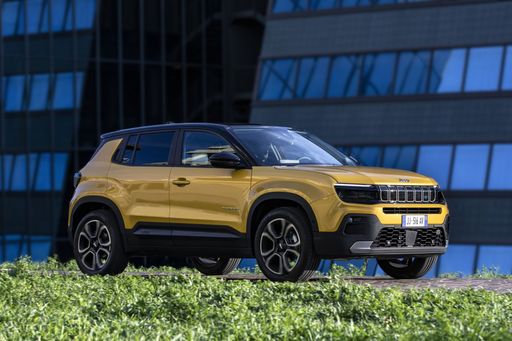 @ Stellantis
@ Stellantis
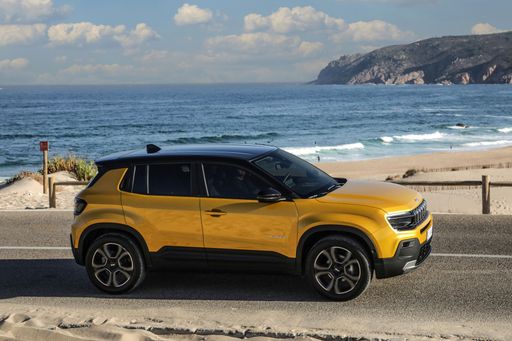 @ Stellantis
@ Stellantis
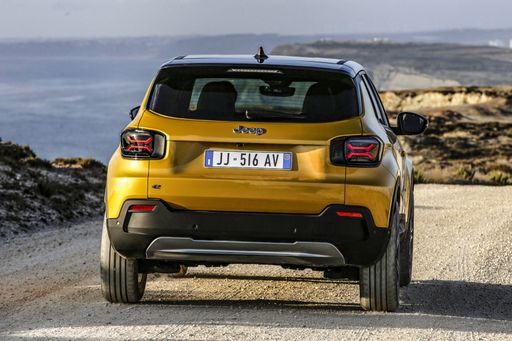 @ Stellantis
@ Stellantis
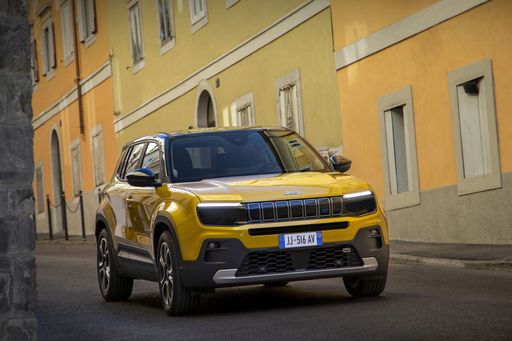 @ Stellantis
@ Stellantis
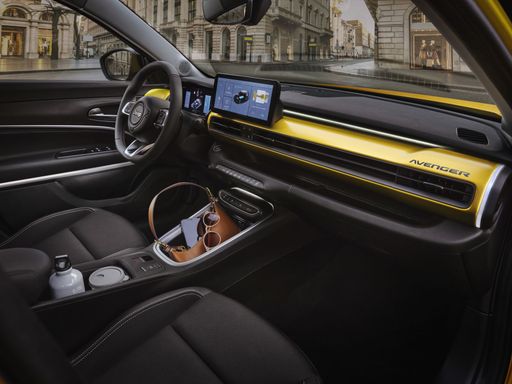 @ Stellantis
@ Stellantis
VW Caddy
The VW Nutzfahrzeuge Caddy Hochdach-Kombi is a versatile choice for those seeking extra space and practicality in their everyday vehicle. With its functional high roof and adaptable interior, it easily accommodates both passengers and cargo. The Caddy also stands out with its modern design and features aimed at providing comfort and convenience on the road.
details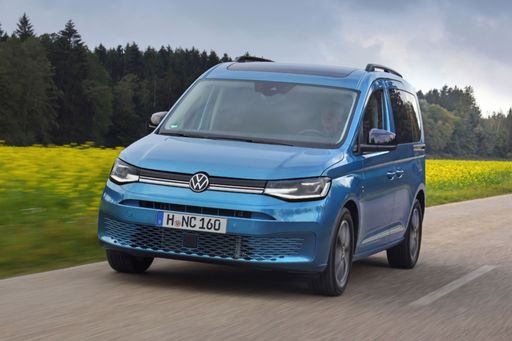 @ vwpress
@ vwpress
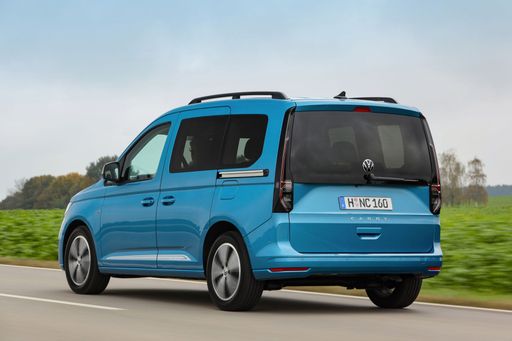 @ vwpress
@ vwpress
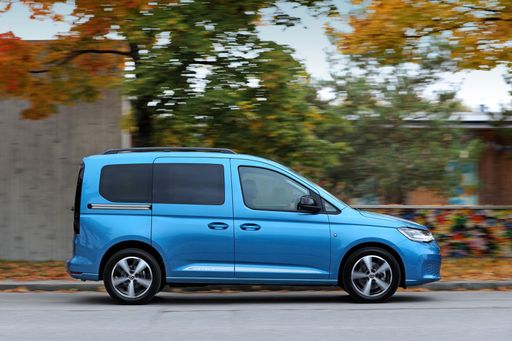 @ vwpress
@ vwpress
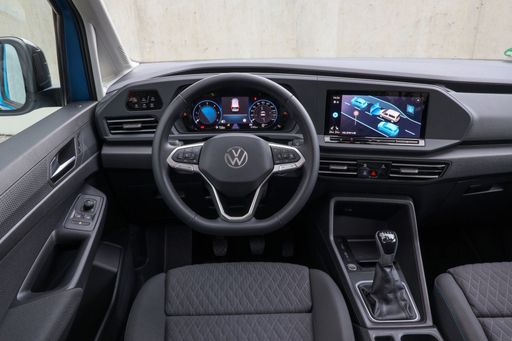 @ vwpress
@ vwpress

|

|
|
|
|
Costs and Consumption |
|
|---|---|
|
Price
21900 - 36900 £
|
Price
27800 - 45900 £
|
|
Consumption L/100km
4.9 - 5.7 L
|
Consumption L/100km
0.5 - 6.9 L
|
|
Consumption kWh/100km
15.50 kWh
|
Consumption kWh/100km
-
|
|
Electric Range
400 km
|
Electric Range
116 - 121 km
|
|
Battery Capacity
51 kWh
|
Battery Capacity
19.70 kWh
|
|
co2
0 - 129 g/km
|
co2
10 - 165 g/km
|
|
Fuel tank capacity
44 L
|
Fuel tank capacity
50 L
|
Dimensions and Body |
|
|---|---|
|
Body Type
SUV
|
Body Type
High Roof Estate
|
|
Seats
5
|
Seats
5 - 7
|
|
Doors
5
|
Doors
5
|
|
Curb weight
1180 - 1520 kg
|
Curb weight
1575 - 1998 kg
|
|
Trunk capacity
325 - 380 L
|
Trunk capacity
-
|
|
Length
4084 - 4088 mm
|
Length
4500 - 4853 mm
|
|
Width
1776 mm
|
Width
1855 mm
|
|
Height
1527 - 1541 mm
|
Height
1819 - 1860 mm
|
|
Payload
494 - 502 kg
|
Payload
501 - 710 kg
|
Engine and Performance |
|
|---|---|
|
Engine Type
Electric, Petrol, Petrol MHEV
|
Engine Type
Petrol, Diesel, Plugin Hybrid
|
|
Transmission
Automatic, Manuel
|
Transmission
Manuel, Automatic
|
|
Transmission Detail
Reduction Gearbox, Manual Gearbox, Dual-Clutch Automatic
|
Transmission Detail
Manual Gearbox, Dual-Clutch Automatic
|
|
Drive Type
Front-Wheel Drive, All-Wheel Drive
|
Drive Type
Front-Wheel Drive, All-Wheel Drive
|
|
Power HP
100 - 156 HP
|
Power HP
102 - 150 HP
|
|
Acceleration 0-100km/h
9 - 10.6 s
|
Acceleration 0-100km/h
11.4 - 14 s
|
|
Max Speed
150 - 194 km/h
|
Max Speed
173 - 186 km/h
|
|
Torque
205 - 260 Nm
|
Torque
220 - 320 Nm
|
|
Number of Cylinders
3
|
Number of Cylinders
4
|
|
Power kW
74 - 115 kW
|
Power kW
75 - 110 kW
|
|
Engine capacity
1199 cm3
|
Engine capacity
1498 - 1968 cm3
|
General |
|
|---|---|
|
Model Year
2023 - 2025
|
Model Year
2024
|
|
CO2 Efficiency Class
A, D, C
|
CO2 Efficiency Class
E, F, B
|
|
Brand
Jeep
|
Brand
VW
|
Jeep Avenger
Unveiling the Jeep Avenger: A New Era of Innovation
The Jeep Avenger marks a significant milestone in automotive evolution, blending ruggedness with modern-day advancements. Established within the SUV category, the Avenger offers an eclectic mix of powertrains, including electric and hybrid options, catering to the diverse requirements of the modern motorist.
Powertrain Options: Efficiency Meets Performance
The Jeep Avenger presents multiple powertrain configurations, each designed to harmonise performance with efficiency. The electric version boasts a formidable 156 PS and a battery capacity of 51 kWh, enabling a remarkable 400 km of electric range. This places it at the forefront of environmentally friendly travel with a consumption of merely 15.4 kWh/100km.
Additionally, for those favouring classic combustion engines, the 1.2 e-Hybrid and the purely petrol 1.2 GSE T3 offer 100 PS and incorporate innovative mild-hybrid technology to enhance fuel efficiency while maintaining a spirited driving experience.
Advanced Engineering: Technology and Design
At the heart of the Jeep Avenger lies a well-engineered chassis, tailored for both agility and comfort. Measuring 4084 mm in length, 1776 mm in width, and up to 1534 mm in height, the Avenger ensures ample space within a compact footprint, ideal for urban manoeuvrability.
The vehicle supports its robust engineering with meticulous design details, from its substantial boot capacity of up to 380 litres to its five-door configuration, seamlessly blending functionality with aesthetic appeal.
Driving Dynamics and Performance
Front-wheel drive ensures that the Avenger's power is perfectly harnessed for both city streets and off-road trails. The vehicle's acceleration capabilities vary between 9 and 10.9 seconds from 0-100 km/h, a testament to its spirited performance ethos. With a maximum speed ranging up to 184 km/h, the Avenger is built to deliver thrilling drives.
Sustainability at the Forefront
As a reflection of Jeep's commitment to sustainability, the Avenger achieves commendable CO2 efficiency ratings spanning classes A to D. The electric model stands out with zero emissions, while hybrid options offer competitive CO2 figures, appealing to eco-conscious drivers.
Pricing and Trim Levels
The Jeep Avenger is strategically priced between 25,000 and 43,500 €, ensuring accessibility for a broad range of customers. With available trim levels such as Longitude, Altitude, and Summit, prospective buyers can tailor their vehicles to suit individual preferences, choosing from different feature sets and functionalities.
Conclusion: The Jeep Avenger's Promise
The Jeep Avenger is not just a new vehicle; it embodies a shift towards innovative, efficient, and dynamic motoring. By merging advanced technology with Jeep's legendary prowess, the Avenger is poised to redefine expectations within the SUV sector, offering both cutting-edge performance and unyielding reliability.
VW Caddy
A Versatile Classic Reimagined: The Volkswagen Caddy
The Volkswagen Caddy has long been celebrated as a versatile workhorse, adeptly bridging the gap between utility and comfort. With its roots tracing back to the 1980s, the Caddy has evolved considerably, transforming from a humble commercial vehicle to a sophisticated multi-purpose van. The latest model continues this tradition by offering innovative features and enhanced technical specifications, reaffirming its status as an indispensable vehicle for both professional and personal use.
Efficient Engines and Environmental Innovation
At the heart of the Volkswagen Caddy lies an array of engines designed to balance performance with efficiency. The latest generation offers a selection of TSI petrol and TDI diesel engines, each engineered to meet the strictest environmental standards. These Euro 6 compliant engines not only reduce emissions but also ensure optimal fuel efficiency, making the Caddy an economically viable choice for businesses and environmentally conscious drivers alike.
For those seeking an even greener option, Volkswagen offers a natural gas engine variant. This innovative powertrain reduces CO2 emissions significantly, yet delivers a driving experience that remains characteristically smooth and powerful. This commitment to alternative energy sources reflects Volkswagen's dedication to sustainability and forward-thinking automotive design.
Advanced Connectivity and Safety Features
The Volkswagen Caddy is not just about robust performance; it also shines in the realm of technology and safety. The modern dashboard is equipped with the Discover Media navigation system, integrating satellite navigation with real-time traffic updates. This intuitive infotainment system gets wirelessly connected to smartphones via Apple CarPlay and Android Auto, keeping drivers informed and entertained during every journey.
Safety is paramount in the latest Caddy, which comes standard with a suite of advanced driver assistance systems. Front Assist with City Emergency Braking ensures crucial safety in urban environments, while Adaptive Cruise Control with speed limiter provides comfort and control on the open road. Additionally, features like the Park Assist system make maneuvering in tight spaces a breeze, offering peace of mind and ease of use no matter the driving conditions.
Dynamic Design and Practicality
Blending aesthetics with functionality, the redesigned exterior of the Volkswagen Caddy is both modern and practical. It features a streamlined silhouette that not only improves aerodynamic efficiency but also enhances its visual appeal. From the distinctive front grille to the LED headlamps, every design element serves a purpose, resonating Volkswagen’s design philosophy of form following function.
Inside, the Caddy offers a remarkably spacious interior, adaptable to a variety of needs. Depending on the configuration, it accommodates up to seven passengers comfortably or can be transformed to offer substantial cargo space, catering to professionals who require versatility from their vehicles. The interior details are thoughtfully crafted, with high-quality materials that sustain durability and comfort over long-term use.
Conclusion: A Modern Mainstay
The Volkswagen Caddy, with its latest iteration, continues to embody versatility and innovation. Its efficient powertrains, cutting-edge connectivity features, and commitment to safety set new standards in the compact van segment. Whether utilized as a family vehicle or a business asset, the Caddy remains a formidable choice, carrying forward a legacy of reliability and ingenuity.
For drivers seeking a well-rounded vehicle that offers the best of both worlds—commercial reliability with personal comfort—the Volkswagen Caddy stands as an exemplary choice. It is not just a vehicle; it's a partner on wheels, designed for the multifaceted demands of modern life.
What drivetrain options does the Jeep Avenger have?
The Jeep Avenger is available as Front-Wheel Drive or All-Wheel Drive.
The prices and data displayed are estimates based on German list prices and may vary by country. This information is not legally binding.
